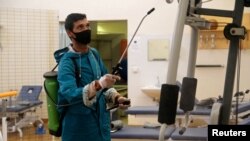Doctors in Libya have braced for a surge in serious coronavirus cases, as the infection rate has jumped in recent weeks.
Latest figures suggest there are over 8,500 cases, with several hundred new infections recorded daily. The true figure is likely to be much higher because testing levels are low and accurate data remain scarce in the conflict-hit country.
Ahmed al-Hassi, a spokesperson for the Coronavirus Epidemic Advisory Medical Committee based in Benghazi, said resources are scarce.
“If we get a surge in numbers, we won't be able to cope, unfortunately," he told the Reuters news agency. “Regarding (hospital) bed capacity, we have about 200 beds for suspected cases, and about 30 beds in the ICU (intensive care unit). We also have about 40 beds for confirmed coronavirus cases. So, if numbers exceed those figures, we won't be able to cover them.”
Officials fear they are losing control of the outbreak. Hot spots include the capital, Tripoli, Misrata in the west, and the city of Sabha in the south. Medics say public behavior is to blame.
“We are still relying on people's awareness,” said Dr. Fadi Farag Fortas, head of the Borg Al-Amal Medical Center in Benghazi. “We rely on their support, hoping they follow the necessary precautions. I hope that the infection rate goes down, that the number of people needing hospital care decreases.”
Fortas added, “If people still go on with their lives without paying attention to these dangers — meeting up in gatherings and weddings, meeting in malls and not taking the precautionary measures agreed upon by all health organizations — then I fear that things will get worse very soon.”
In western Libya, people are required to wear face masks in public areas. In the east, which is run by a different administration, there is no such law. With the economy severely weakened by years of conflict between rival factions, many people say they cannot afford basic equipment like masks.
The conflict has destroyed several medical facilities, while those that remain have shortages of personal protective equipment and testing kits. Frequent summer power outages make life even more difficult for hospital staff. Health experts warn of a potential catastrophe.
“The capacity of health systems to be able to deal with a surge in infections, particularly those requiring more advanced care like ventilators, is just not going to be possible,” said Dr. Peter Drobac of the University of Oxford, who is an expert on health systems in developing countries.
There are fears for the health of the thousands of migrants in Libya trying to reach Europe. Many are held in extremely poor conditions in detention centers.
The United Nations last month reopened a Tripoli clinic that had been closed since the start of the pandemic and serves more than 30,000 people in the capital.
“We are working here in this facility to provide free-of-charge health care access for all, regardless of their background,” said Dr. Meftah Lahwel of the United Nations High Commissioner for Refugees.
Tests on some migrants arriving by boat to Malta and Italy from Libya in recent months show high coronavirus infection rates. Those affected were quarantined on arrival.







